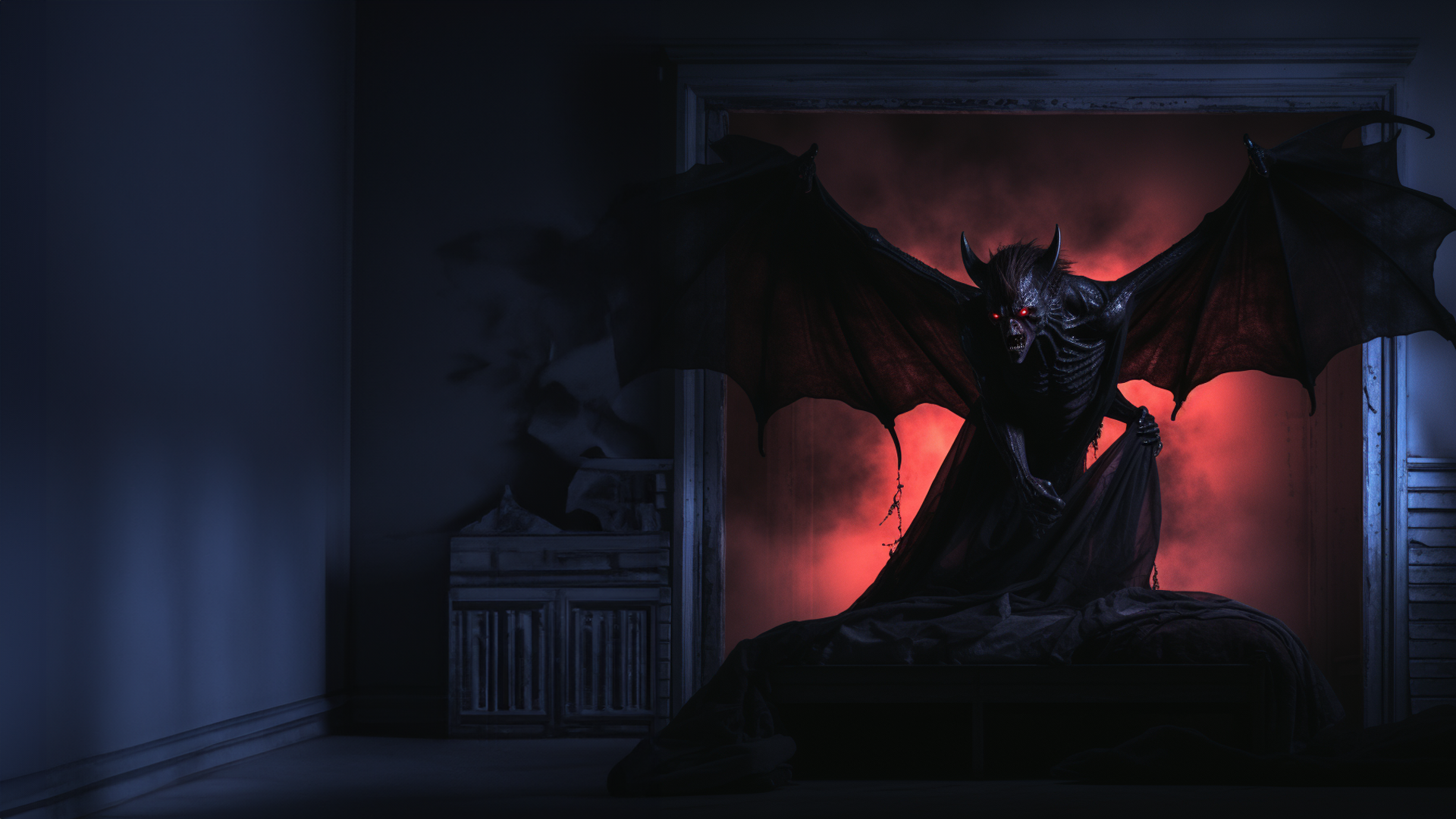
Eternal Recurrence
I want you to imagine for just a moment that you are lying in your bed, surrounded by darkness, the night is cold, but you are warm, sleepy, and just about to drop off, when you notice something black forming like a pillar of smoke amidst the darkness at the foot of your bed. Somehow or other it seems blacker than the night, like a solid shadow taking the shape of a human being with coal bright eyes that burn like two stony embers, alive with the fires of hell. As if to dispel any further doubts, the creature before you, this strange creation, this embodiment of evil unfolds a pair of bat-like, leathery wings, the tips of which gently touch each side of your bedroom.
It’s got your attention, you are now wide awake, panic rises in your chest, eyes wide open, yet wondering if you are dreaming, you’d fumble for the light switch but a pressure in your head prevents you from doing so, you have no choice but to lie there paralysed and afraid as the entity turns its attention to you and says:
“This life as you now live it and have lived it, you will have to live once more and innumerable times more; and there will be nothing new in it, but every pain and every joy and every thought and sigh and everything unutterably small or great in your life will have to return to you, all in the same succession and sequence — even this spider and this moonlight between the trees, and even this moment and I myself. The eternal hourglass of existence is turned upside down again and again — and you with it, speck of dust!”
Friedrich Nietzsche – The Gay Science
This scenario, posited by Nietzsche in the Gay Science weighs heavily upon you when you awaken the next morning, the gentle sunlight of a brightening day streams in through the window, all that remains of the demon, the messenger from the forbidden realms, is a black powder where once he stood at the foot of the bed. You know that this was no ordinary occurrence, and neither was it a dream, but an actual event that it seems you must live over and over again, an infinite number of times thus. This life as you have lived it, you have lived an unlimited number of times before and this life as you have lived it you are condemned to live it an endless number of times to come. How would you have answered the demon, how does it make you feel? Are you happy with your life choices and their outcomes thus far, is there anything that you would change knowing that whatever it is, then you must experience it again and again and again in a repeating pattern that lasts for all of time.
Is one repeat enough? Wouldn’t it be enough, Vlad Vexler thought so on his video on this subject (link below) and whilst Vlad is clearly a Nietzsche scholar and I am not, I think that Nietzsche stresses the eternal aspect of this conundrum in order to make it even more horrifying. This life as you have lived it, you must live forever more. It’s almost Lovecraftian in design, an eldritch terror. The same applies to his use of the words ‘speck of dust.’ It’s a statement designed to make us feel powerless, insignificant, and cosmologically worthless. In other words, there’s nothing we can do about it, but the same applies to the demon. We are both creatures caught up in the dance of eternal recurrence, in which the needle gets moved to the start of the record over and over again for as long as there is time.
If life was full only of Joy and pleasures, we’d all answer in the affirmative, but we know from our experience of being extremely limited human beings caught up in the ongoing march of entropy that sees us born, made adult and then sent into decline by sickness, disease, and old age, that life will give us things that we do not want, not now and not ever. We also know that other people will go out of their way to hurt us, to thwart our plans to denigrate our achievements and besmirch our characters. In other words, the future, just like the past, is guaranteed to be full of pain and suffering that is almost unbearable. The weight of eternity is the agonising realisation of sorrow!
In Vlad’s video he points out that most commentators on this subject (himself included) consider the idea of eternal recurrence as postulated by Nietzsche to be a thought experiment and when I first encountered this incredibly famous passage by Nietzsche, I too thought the same, but I have come to the rather unpleasant conclusion that Nietzsche believed it to be true, he mentions or alludes to the idea time many times across his works for it to be otherwise, but I may be, and probably am extremely ignorant on this subject. To put it simply, if you have infinite time, then everything that has already happened must at some point, happen again. It must recur in the same succession and sequence.
The Big Bang and Quantum Mechanics.
You see, the big bang as the beginning of existence was a fact of life in the physics and cosmology community for a long time thanks to the discovery of the Cosmic Microwave Background which is the left-over flash from this primordial eruption of spacetime. These same scientists used to say that nothing existed before the big bang because it represented ‘one,’ on the cosmological clock and nothing can come before that, ‘zero,’ let’s remind ourselves doesn’t exist, it’s an abstraction designed to smooth out the creases in our mind. Yet for all of this, the latest rumblings from the physics community seem to hint at the presence of something before the big bang, possibly another universe even. Don’t take this too seriously though, it’s not confirmed and still contested physics, and certainly not mainstream, but I suspect that the big bang that kick started our cosmos is a continuation of some other physical process that points to a preexisting universe, but I am happy to be told otherwise by someone competent. Like all good philosophers I desire only the truth, an unpleasant fact is always better than a pleasant fiction. If true, how many big bangs have occurred before this one? When in nature does something only happen once? Then, when you consider the many worlds or Everet interpretation of quantum mechanics anything is possible. This small, sad, isolated universe that we call home exists as one of an infinite number that are bound together in relationships of probability. The result being that anything that is possible within physical law must therefore be happening right now somewhere in the multiverse. This is just a fancy way of saying, that everything that has happened before must at some point happen again and again an infinite number of times in this universe or across the multiverse.
Nietzsche couldn’t have been aware of all of this, but he would have been familiar with the idea of endless time and cyclical visions of history repeating itself over and over again, this is common in Greek myth of which he was a scholar. The gods order the world and then destroy it, before recreating it again. The gods are rational beings and so would make the same best choices over and over again, resulting in the recreation of the world as we know it, you are one of those choices and so you too would be condemned to live again, to recur. This life as you have lived it, you must have lived countless times before and you will continue to live it countless times into endless time. Likewise, Nietzsche was no stranger to the eastern philosophies of the Buddhists and the Hindu’s who also share a similar view that life is cyclical, that eternity is a flat line bound into a circle that repeats eternally. Human beings it seems, take comfort in the thought of reincarnation and a metaphysic of eternal existence. This may have shaped his thinking, but again I cannot be sure because I am not a Nietzsche scholar, for me this is speculation, but I digress how would you feel if you had to live this live over and over again? What would you change if anything at all?
Amor Fati
Used correctly, this thought experiment becomes a powerful tool for self-improvement because from this moment onwards you are made mindful to make beneficial changes that might work out well for you as you sublimate your own will to power (see other video) upon yourself so that you may overcome your past failures and present day weaknesses, those barriers that are preventing you from being all that you can be, those obstructions of your best life must become the focus of your indomitable will to power. As for the other stuff, the unpleasant stuff, the unavoidable pain that blights every life, that too must be overcome, nobody gets out of life without the experience of suffering and we must learn to love this too, to accept our fate wholeheartedly and with equanimity, sublime indifference even. In doing so, we overcome it making it a part of our own personal greatness as we undertake the grand work of self-improvement which Nietzsche describes as living for personal gain. We must not only love our past, love our present, but we must also love the as yet unknowable outcomes of all future choices and must take the view that no other past, present, or future is possible. This is the hand of cards that fate dealt us and we must play them as our own, what else could be more fitting? This life as we have lived it and will continue to live, we have experienced an infinite number of times before. Our fate is prewritten, and we must love it before we can master it. All obstacles must fall before our will to power and if they cannot, then we must accept them for what they are, the grit that makes pearls of us. In the end for Nietzsche the development of our character is the most important thing, and the ever-present experience of infinite lives gives him and us an infinite opportunity to overcome the hurdles that are a necessary component of a good life as they allow us to prove one’s own personal greatness and in doing so prove that we are worthy of life which is why Nietzsche answered thus:
“Would you not throw yourself down and gnash your teeth and curse the demon who spoke thus? Or have you once experienced a tremendous moment when you would have answered him: “You are a god and never have I heard anything more divine!” If this thought gained possession of you, it would change you as you are or perhaps crush you; the question in each and every thing, “Do you desire this once more, and innumerable times more?” would lie upon your actions as the greatest weight! Or how well disposed would you have to become to yourself and to life to crave nothing more fervently than this ultimate eternal confirmation and seal.”
The Turin Horse
On January 3, 1889, Nietzsche witnessed a horse being whipped by its driver and threw himself onto the neck of the animal to defend him from the blows. Some accounts state that he was known to have said ‘I understand your pain,’ but this cannot be confirmed. Nietzsche burst into tears and that same day was almost arrested for rioting but was saved by his Italian host and taken home, he was admitted to a clinic before being transferred into the care of his sister Elizabeth Forster Nietzsche and never spoke another word to anyone, ever again, save for the odd incoherent mumbling or short sentence such as ‘I used to write books, they were good books,’ etc. I like to think that he spent the next 11 years steadfastly doing his best to overcome his progressive brain disease. I hope so, the man is a giant, you cannot study philosophy without encountering Nietzsche, his brilliance cannot be understated…
So, let’s recap.
How would you feel if you had to live your life over and over again, what would you do differently in the present moment to make for a future that you might like to live in? Take this philosophical insight seriously as it may well be the most accurate description of reality that we can muster! You may really have to live this life over and over again, but at least now you are aware of this possibility and in the fashion of great men everywhere you can at least prepare for it. With infinite opportunities to experience the highs and lows of life you have an infinite opportunity to discharge your will to power and to overcome. It’s in the overcoming of difficulties that life is made grand, purposeful, and meaningful. If like Nietzsche, you can answer the demon “You are a god and never have I heard anything more divine!” then you have all that you need within you to live a good life, a Nietzschean life dedicated to personal gain, because the will to power is alive and well within you and the will to power is when it’s all said and done the very essence of life, for Nietzsche, a good life is one in which the will to power is successfully discharged, hence the doctrine of overcoming.
“The world itself is the will to power – and nothing else! And you yourself are the will to power – and nothing else!” – Nietzsche – The Will to Power.
On a personal note, this realisation led me to gratitude, there are other times in which one could have lived, not just once, but an infinite number of times over. It makes me glad for that which is good in my life, and compassionate for those who do not have the gains that I have, my empathy overflows and that too is the will to power. I for one intend to use it well, to do good things in so far as I judge them to be and to overcome all that gets in my way. My overcoming shall be the meaning of my life. I wish you the same…

